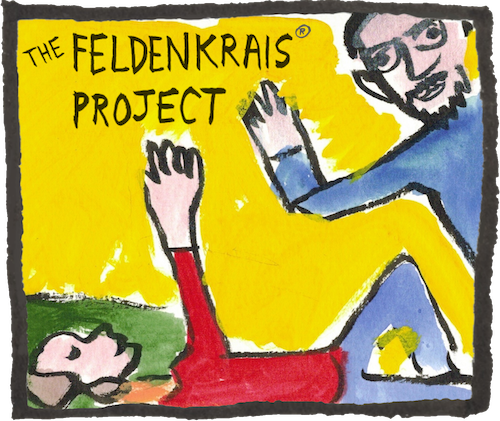Difficulty: Average Challenge
61m
Effortless Arms and Shoulders (Patrons)
Side-lying, arm extended toward the ceiling. Sensing, organizing, and expanding effortless movements of the arm and shoulder by integrating them with the whole self, with particular attention to imagery of lengthening the torso. Learning to sense the gravitational plumb line and its neuromusculoskeletal relationship with ease and effort.
62m
Stepping Down, with a Bias (Patrons)
This mostly side-lying lesson explores the relationship of our natural spinal bias with our uprightness. It's designed to help us clarify and harness the fine movements and wonderful sensitivity and power available throughout our spine as we step down. "Stepping down" is how we organize ourselves to deliver force through our legs as we stand, balance, walk, and move in all upright activities.
33m
Finding and Using Your Spinal Bias to Step Down (33m, Patrons)
Framed by brief explorations in standing, this mostly side-lying lesson helps you discover your primary spinal bias. You’ll explore how a refined awareness and conscious use of your spine’s natural bias can improve how you send your foot out into the world in all upright activities.
63m
Spine and Chest Side-Bending, Lengthening Limbs
Framed by standing explorations of how we shift weight onto one foot, this mostly back-lying lesson (often one or both knees bent) is designed to free the torso and improve awareness, suppleness, and integration of lateral movements of the spine and chest in walking. Includes explorations of sensing and initiating movement from the spine.
65m
Walking with Your Sternum (Patrons)
Back-lying, often knees bent. Learn how preparatory movements for taking a step involve the whole self. Sense and explore movements of the sternum, both as a reference and a challenge to expand the self-image of walking. Arms lengthening and sweeping in many directions encourages suppleness of the chest and awareness of the sternum, and helps integrate the arms with movements of the pelvis, hips, and walking.
61m
Nodding into Lengthening the Heels (Patrons)
Back-lying, often one or both knees bent, exploring relationships of "nodding" parts of ourselves in the sagittal (up/down) plane, including head, pelvis, one foot, and two feet, to better organize the full unfolding of the legs and send our heels into the world, a function essential for clear skeletal support while standing or walking.
62m
Connecting the Legs and Chest (Patrons)
Mostly side-lying, exploring relationships of the head, spine, chest, and pelvis with a riddle: how do we actually lengthen a leg? Designed to bring awareness and improvement to an action we need for every step we take in the world, this lesson uses breath, foundation forces, and "hinging" at the feet and knees to connect our image of leg lengthening with our whole self, especially the chest.
59m
Basic Arching and Folding (Patrons)
Front-lying, improving the organization of the extensor muscles of the back and distributing their efforts. Learning to lift the head and one arm – and later, one leg – away from the ground together. Integrating the eyes with these arching movements. Alternates with back-lying, knees bent, feet standing, basic folding (flexion) movements, as the brain is always coordinating the major flexors and extensors of the body with each other.
57m
Folding, Arching, and Rolling (Patrons)
Mostly side-lying. Refining our awareness and skill in the many ways we can gather the front of the body together (flexion, or folding) and also extend the spine and lengthen the front (arching), including very fine work with the spine, sternum, and shoulders. Integration of breathing with these ideas. Experiments at the end of the lesson turn these primary functions into rolling.
62m
Simple Twisting
Back-lying, often both knees bent. Tipping crossed legs and eventually "triangle arms" to gently twist, turn, and roll the body, in order to learn more awareness, control, and coordination of the major flexor and extensor muscles of the torso.
